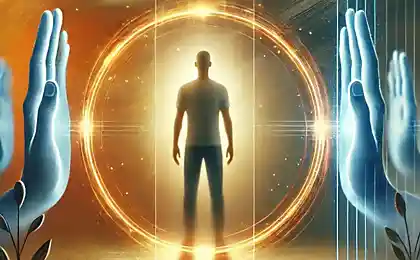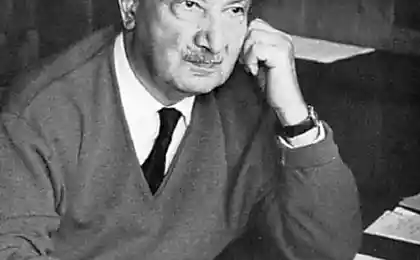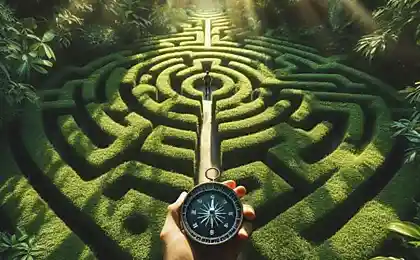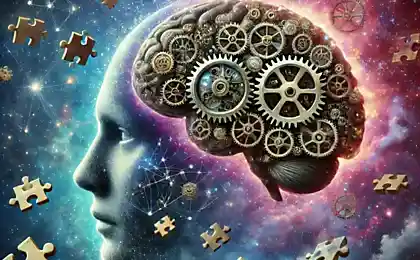183
The boundaries within us
Why in the postmodern era, when everything is possible, people began to cling to patterns of behavior, frameworks and rules? Why does man need a boundary within consciousness when even society is gradually outgrowing the artificial limitations of freedom?
Human progress is aimed at liberation. Humanity is slowly moving towards absolute freedom. If you doubt this thesis, you can refer to Hegel, who already understood where history was going. In the ancient world, Georg Hegel said, one king was free, and all the others were slaves in one way or another. In ancient Greece, quite a few people were already free, but real freedom came, Hegel believed, in his era of German romanticism.
Had Hegel known that our time was not far off, he would not have been surprised. Everything is logical, would say the German philosopher, came postmodern, and it became possible absolutely everything. Total freedom, even for women and blacks.
But there's something the great thinker missed. Hegel did not take into account human limitations, and this is not surprising, because he himself thought on an exceptionally large scale, although he was a layman in everyday life, like everyone else.

Postmodern people, that is, modern people, are faced with a problem that did not exist before. Freedom. You can choose what you want. Live as you want. Of course, there are circumstances. But serfdom, rigid social hierarchy, gender and racial inequality, in principle, are gradually out of fashion.
And it turns out that a person can not without artificially created frames. Do you think we live in a police state? No, the police are in their heads. For example, suddenly people began to fence their yards. It's not the dangerous nineties right now. Instead of expanding their territory, considering their home not only the apartment, but also the street and the city, the modern bourgeois equip closed courtyards, where they aggressively keep outsiders out. It would seem like a pleasure to walk around some yard of your city on a summer evening. But no. Now there are fences. This is just one manifestation of the trend.
It is worth expressing a thought that does not fit into the usual rut, the inner Mizulina turns on in the head of a modern person and says “but-but”. But this text will not be about politics at all. Everyone is talking about politics now, and few people manage to maintain a reputation as a witty person.We’re going to talk about everything that concerns everyone. About relationships. The situation of complete freedom in postmodernity whispers to our unconscious: “Come on, everything is possible!” The unconscious joyfully raises its head. The psychic power of the superego automatically increases. Otherwise something irreparable will happen.
The super-ego, that is, the inner strict censor, in modern man becomes much tougher and more irreconcilable than ever before. Modern people build their own boundaries and boundaries and do not notice it. Each
A man puts himself in his own shell. It may be different, but the essence is one – a hard border. For example, a young man thinks he is gay. All right, we gotta match. He will never try anything that goes beyond the concept of a gay boy. Just out of curiosity. You will say that the direction of libido is a serious matter. No, Habit, stereotype and lack of curiosity in life are what are truly unshakable.
In the seventeenth century, people were simpler. The aristocratic omnivorousness of New Time libertines is understandable, logical, and not contrary to human nature. But today this simple attitude to sexuality is too difficult to understand. Either you are gay, straight, or some other label is required for self-identification. A person cannot situationally and spontaneously adapt to a new challenge from life, it is necessary to have a template ready for you to build your behavior. And if there is no template, it is better to just run away or use the principle of NNP (Not Our Problem).
Modern man has a hard guide in his mind. But this is not an aesthetic addiction, as you might think. If you suddenly have some irrational attraction to golden skin or, for example, muscular hands, this is normal. If you know for sure that you like slim and beautiful, that’s fine. But an interesting cultural problem is that the templates of modern man have no aesthetic background. And this is something new in history.
Until now, people tend to at least vaguely suspect what they like personally. It's aesthetically, visually. Peter Paul Rubens loved fat women, Michelangelo Caravaggio - plebeian boys, Gustave Courbet - unshaven armpits, Alphonse Fly - beautiful long-haired girls with soft hands, Leopold von Sacher-Masoch - fur and cruelty, Margaret Mitchell - tall brown muscular brunettes. Everyone could roughly outline their ideal, and then deviate from it in one direction or another.
Modern people know little about their personal preferences and desires. He is subjected to a powerful information attack of hyperreality: television, the Internet, the media. In this universe, the ideals of beauty are clearly defined, and no one argues with them. A few years ago, the fashion for painfully thin women slipped, now frail men and schoolgirls are trending. But that’s fine, following fashion is the way out for those who don’t have an opinion of their own, and their majority.
What is more interesting is the unconscious framework that a person sets for himself. More precisely, his unconscious. Modern man is sluggish, uninitiative, weak. And he's afraid of what's best. Therefore, when choosing, everyone slightly lowers their bar. One boy told me that he preferred to pick silly boyfriends because they made him seem smart.
Women also accept the second grade. How often do you hear, “I chose him not for his beauty, but for another.” What else? A sensitive soul? Intelligence? Will? As a rule, chosen "for another" turns out to be a rather indistinct type.
Now it seems to you, perhaps, that the author of the text has slipped from the topic of frames and personal boundaries to banal criticism. No, we're still following the subject. Just the voiced average level is the limit that modern man cannot and does not want to overcome in his unconscious choice. Nowadays, people are afraid of personalities, afraid of the non-standard. They're afraid of screwing up.
So, as long as social boundaries existed, people were guided, at least subconsciously, by their own aesthetic preferences. Hence so many novels of the XIX century about mesalliances, poor but correct Jane Eyre, stupid but strong Scarlett O’Hara, kind but ugly Quasimodo.
Social boundaries have weakened, and people have built them in their heads. Everyone has become depressingly rational. This transformation happened literally before our eyes. The nineties can be called the last years of romance. People experimented with religions, played to extremes, even the KVN was witty.
The generation born in the 1990s are children of stability with stability in their heads. They will grow up, start a family early, work... Society must maintain its existence, and when the levers to direct people from outside are weakened, internal mechanisms are activated.
Another cultural reason for this “stabilization” of the psyche is closely related to the first: the decline of the art of reading. Books are still written, and there are no fewer talented authors in our time than ever, and there are even more opportunities for their search and capture. But with the migration of humanity to the web, books naturally faded into the background. This is normal, but the consequences were not long in coming.
It is obvious to everyone that when a person reads, his imagination, including his emotional, turns on. If a book is replaced by a film, a visual picture, the imagination is less involved in the process. If the film is replaced by a phlegmatic flip of the friend, the mechanisms of emotional involvement in the imaginary world gradually atrophy. The ability to feel is the achievement of culture. As humanity evolves, it becomes more refined, more sensitive.
A man who is incapable of feeling cannot desire either. This leads to disadaptation in the space of life. If a person not only does not know what he wants, but also has no idea that he can want something, then he simply needs some guidelines. And these guidelines become unconscious rules.Rules that do not allow you to come up with a wonderful dream and follow it. Rules that allow you to easily and painlessly live life.
Modern man simply avoids pain. By and large, he wants to avoid death. It is now, in postmodernity, that this has become relevant not because it has become dangerous, but precisely because of this very boundary, which has been lined up in the subconscious, that there has been a clear separation of life from death, black from white, right from wrong, chick from friend.
As long as man was able to imagine, his world was inhabited by gods. Life and death were one and the same. Even in the nineteenth century, it was understood that true love is inextricably linked to pain, and only this is valuable. You cannot experience passion without throwing yourself into the fire. You cannot learn anything about life if you avoid pain.
But modern man, especially those born in the nineties and later, does not want to know anything about life. Today’s kids don’t need a passion experience because they didn’t have an example. They did not read the program books of romantics, or even the Three Musketeers. They have no curiosity about life. They are versed in technical innovations, but their souls are empty and simple.
The attainment of freedom is connected with the absence of fear. It never occurred to Georg Hegel that one day life would be so comfortable that any pain would be frightening. So much so that one will abandon the movement towards freedom and self-knowledge only because he will seek to avoid pain and fear for his comfort.
Curiosity is about overcoming your own boundaries. Hermann Hesse, another clever German, used the word transcendere to mean “to cross the limits.” What turns you on? What keeps you awake? What causes your hatred and passion? These questions are not very interesting to modern Internet users, because you can find out the answer to them only in one way: make a leap into the unknown, sweep the border. published
P.S. And remember, just by changing our consciousness, we change the world together! © Join us on Facebook , VKontakte, Odnoklassniki
Source: cablook.com/mirror/dialektika-granitsy/
Human progress is aimed at liberation. Humanity is slowly moving towards absolute freedom. If you doubt this thesis, you can refer to Hegel, who already understood where history was going. In the ancient world, Georg Hegel said, one king was free, and all the others were slaves in one way or another. In ancient Greece, quite a few people were already free, but real freedom came, Hegel believed, in his era of German romanticism.
Had Hegel known that our time was not far off, he would not have been surprised. Everything is logical, would say the German philosopher, came postmodern, and it became possible absolutely everything. Total freedom, even for women and blacks.
But there's something the great thinker missed. Hegel did not take into account human limitations, and this is not surprising, because he himself thought on an exceptionally large scale, although he was a layman in everyday life, like everyone else.

Postmodern people, that is, modern people, are faced with a problem that did not exist before. Freedom. You can choose what you want. Live as you want. Of course, there are circumstances. But serfdom, rigid social hierarchy, gender and racial inequality, in principle, are gradually out of fashion.
And it turns out that a person can not without artificially created frames. Do you think we live in a police state? No, the police are in their heads. For example, suddenly people began to fence their yards. It's not the dangerous nineties right now. Instead of expanding their territory, considering their home not only the apartment, but also the street and the city, the modern bourgeois equip closed courtyards, where they aggressively keep outsiders out. It would seem like a pleasure to walk around some yard of your city on a summer evening. But no. Now there are fences. This is just one manifestation of the trend.
It is worth expressing a thought that does not fit into the usual rut, the inner Mizulina turns on in the head of a modern person and says “but-but”. But this text will not be about politics at all. Everyone is talking about politics now, and few people manage to maintain a reputation as a witty person.We’re going to talk about everything that concerns everyone. About relationships. The situation of complete freedom in postmodernity whispers to our unconscious: “Come on, everything is possible!” The unconscious joyfully raises its head. The psychic power of the superego automatically increases. Otherwise something irreparable will happen.
The super-ego, that is, the inner strict censor, in modern man becomes much tougher and more irreconcilable than ever before. Modern people build their own boundaries and boundaries and do not notice it. Each
A man puts himself in his own shell. It may be different, but the essence is one – a hard border. For example, a young man thinks he is gay. All right, we gotta match. He will never try anything that goes beyond the concept of a gay boy. Just out of curiosity. You will say that the direction of libido is a serious matter. No, Habit, stereotype and lack of curiosity in life are what are truly unshakable.
In the seventeenth century, people were simpler. The aristocratic omnivorousness of New Time libertines is understandable, logical, and not contrary to human nature. But today this simple attitude to sexuality is too difficult to understand. Either you are gay, straight, or some other label is required for self-identification. A person cannot situationally and spontaneously adapt to a new challenge from life, it is necessary to have a template ready for you to build your behavior. And if there is no template, it is better to just run away or use the principle of NNP (Not Our Problem).
Modern man has a hard guide in his mind. But this is not an aesthetic addiction, as you might think. If you suddenly have some irrational attraction to golden skin or, for example, muscular hands, this is normal. If you know for sure that you like slim and beautiful, that’s fine. But an interesting cultural problem is that the templates of modern man have no aesthetic background. And this is something new in history.
Until now, people tend to at least vaguely suspect what they like personally. It's aesthetically, visually. Peter Paul Rubens loved fat women, Michelangelo Caravaggio - plebeian boys, Gustave Courbet - unshaven armpits, Alphonse Fly - beautiful long-haired girls with soft hands, Leopold von Sacher-Masoch - fur and cruelty, Margaret Mitchell - tall brown muscular brunettes. Everyone could roughly outline their ideal, and then deviate from it in one direction or another.
Modern people know little about their personal preferences and desires. He is subjected to a powerful information attack of hyperreality: television, the Internet, the media. In this universe, the ideals of beauty are clearly defined, and no one argues with them. A few years ago, the fashion for painfully thin women slipped, now frail men and schoolgirls are trending. But that’s fine, following fashion is the way out for those who don’t have an opinion of their own, and their majority.
What is more interesting is the unconscious framework that a person sets for himself. More precisely, his unconscious. Modern man is sluggish, uninitiative, weak. And he's afraid of what's best. Therefore, when choosing, everyone slightly lowers their bar. One boy told me that he preferred to pick silly boyfriends because they made him seem smart.
Women also accept the second grade. How often do you hear, “I chose him not for his beauty, but for another.” What else? A sensitive soul? Intelligence? Will? As a rule, chosen "for another" turns out to be a rather indistinct type.
Now it seems to you, perhaps, that the author of the text has slipped from the topic of frames and personal boundaries to banal criticism. No, we're still following the subject. Just the voiced average level is the limit that modern man cannot and does not want to overcome in his unconscious choice. Nowadays, people are afraid of personalities, afraid of the non-standard. They're afraid of screwing up.
So, as long as social boundaries existed, people were guided, at least subconsciously, by their own aesthetic preferences. Hence so many novels of the XIX century about mesalliances, poor but correct Jane Eyre, stupid but strong Scarlett O’Hara, kind but ugly Quasimodo.
Social boundaries have weakened, and people have built them in their heads. Everyone has become depressingly rational. This transformation happened literally before our eyes. The nineties can be called the last years of romance. People experimented with religions, played to extremes, even the KVN was witty.
The generation born in the 1990s are children of stability with stability in their heads. They will grow up, start a family early, work... Society must maintain its existence, and when the levers to direct people from outside are weakened, internal mechanisms are activated.
Another cultural reason for this “stabilization” of the psyche is closely related to the first: the decline of the art of reading. Books are still written, and there are no fewer talented authors in our time than ever, and there are even more opportunities for their search and capture. But with the migration of humanity to the web, books naturally faded into the background. This is normal, but the consequences were not long in coming.
It is obvious to everyone that when a person reads, his imagination, including his emotional, turns on. If a book is replaced by a film, a visual picture, the imagination is less involved in the process. If the film is replaced by a phlegmatic flip of the friend, the mechanisms of emotional involvement in the imaginary world gradually atrophy. The ability to feel is the achievement of culture. As humanity evolves, it becomes more refined, more sensitive.
A man who is incapable of feeling cannot desire either. This leads to disadaptation in the space of life. If a person not only does not know what he wants, but also has no idea that he can want something, then he simply needs some guidelines. And these guidelines become unconscious rules.Rules that do not allow you to come up with a wonderful dream and follow it. Rules that allow you to easily and painlessly live life.
Modern man simply avoids pain. By and large, he wants to avoid death. It is now, in postmodernity, that this has become relevant not because it has become dangerous, but precisely because of this very boundary, which has been lined up in the subconscious, that there has been a clear separation of life from death, black from white, right from wrong, chick from friend.
As long as man was able to imagine, his world was inhabited by gods. Life and death were one and the same. Even in the nineteenth century, it was understood that true love is inextricably linked to pain, and only this is valuable. You cannot experience passion without throwing yourself into the fire. You cannot learn anything about life if you avoid pain.
But modern man, especially those born in the nineties and later, does not want to know anything about life. Today’s kids don’t need a passion experience because they didn’t have an example. They did not read the program books of romantics, or even the Three Musketeers. They have no curiosity about life. They are versed in technical innovations, but their souls are empty and simple.
The attainment of freedom is connected with the absence of fear. It never occurred to Georg Hegel that one day life would be so comfortable that any pain would be frightening. So much so that one will abandon the movement towards freedom and self-knowledge only because he will seek to avoid pain and fear for his comfort.
Curiosity is about overcoming your own boundaries. Hermann Hesse, another clever German, used the word transcendere to mean “to cross the limits.” What turns you on? What keeps you awake? What causes your hatred and passion? These questions are not very interesting to modern Internet users, because you can find out the answer to them only in one way: make a leap into the unknown, sweep the border. published
P.S. And remember, just by changing our consciousness, we change the world together! © Join us on Facebook , VKontakte, Odnoklassniki
Source: cablook.com/mirror/dialektika-granitsy/
























